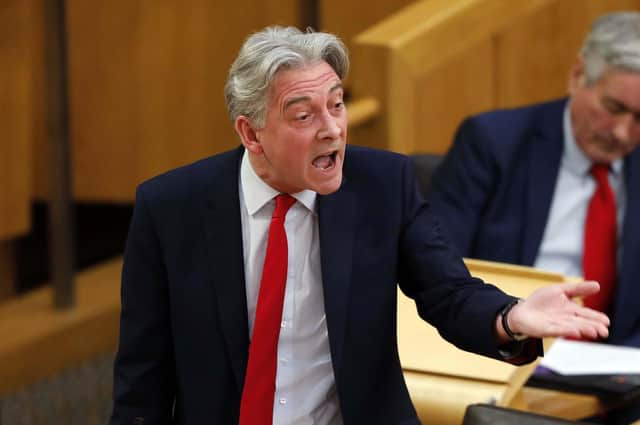Richard Leonard's resignation shows politics is a hard place for 'nice guys' but can Nicola Sturgeon tough it out? – John McLellan


“Richard Leonard was Scottish Labour’s ninth leader in the devolved era and easily the worst,” wrote its political editor Paul Hutcheon on Thursday after his sudden but expected resignation. “His best day in the job was also his last.” Ouch.
There was no shortage of praise for Mr Leonard’s amiable character, not least from First Minister Nicola Sturgeon who could afford to be magnanimous knowing she has stamped his party into near oblivion.
Advertisement
Hide AdAdvertisement
Hide AdWhen I knew him in our student days he was indeed a very personable chap, but not one anybody would have predicted was set for national political leadership. Our contemporary Jack McConnell, however, always had the unmistakable glint of ambition which he subsequently realised, as the future First Minister did the rounds as union president to make his presence felt.
It’s hard not to feel sorry for anyone publicly ripped to shreds almost daily and Mr Leonard was either fortunate or unlucky to endure it for three years. The praise from retiring left-wing Lothian MSP Neil Findlay contrasted sharply with the judgement of Brian Roy, who until 2019 served with Mr Leonard as Scottish Labour’s general secretary.
“His time as leader has been mired by bad decisions and poor performance,” he wrote on Twitter. “His leadership has hollowed out the party organisation and driven talented people out.”
It’s hardly the way Mr Leonard would have wanted his achievement of becoming Labour’s second longest-serving leader of the devolution era to be marked, but no-one forced him to do the job and once the unelectable Jeremy Corbyn was finished the only surprise was it took him so long to go.
As his stint as Scottish Labour leader entered its last hours, I was at the other end of the political spectrum at an online Edinburgh Council committee, the meeting blissfully unaware of the mini-drama unfolding at the bottom of the virtual Royal Mile.
It wasn’t the liveliest of meetings, and for once party politics didn’t play much part, but one effect of Labour’s hard-left leadership at national level has been a loss of pragmatism locally, sanctioning alliances with a hard-left SNP while the Nationalists get on with the business of the party’s destruction.
In Edinburgh, it has hamstrung Labour opposition to the SNP’s squeeze on local government spending, with the party endorsing severe cuts to key local services its MSPs are trying to prevent. Knowing abstentions result in disciplinary action, even those Labour councillors who complain about the impact of their coalition partner’s choices vote them through anyway.
How much difference Mr Leonard’s resignation makes at council level is debatable, but going into a key election campaign it makes it far harder for Labour in those areas where it is in coalition with the SNP to argue it is an effective opposition when on big policies like education, transport and housing it is effectively an agent.
Advertisement
Hide AdAdvertisement
Hide AdSomehow, Labour can’t pull off the SNP’s trick of making the majority believe it can be both in opposition and control and neither, it must be said, have the Conservatives. For the SNP the opposition is always London, and the devolution settlement the guidebook for the game of perpetual grievance which constitutional reform will not end.
Arguments about policies and alliances count for little compared to leadership and circumstances, and there is no more stark illustration than this week’s Scotsman polling figures.
With the same hapless leadership in Scotland, Labour support nudged upwards because the top job in London changed from the unelectable Jeremy Corbyn to the credible Sir Keir Starmer, even though he’s not up for election and hardly brimming with charisma.
It’s too soon to say whether Jackie Baillie or Anas Sarwar will significantly improve Labour’s fortunes, but the suggested return of Gordon Brown sounds more like a desperate fear the replacement will have no more impact than Johann Lamont, Iain Gray or Kezia Dugdale.
The parallels for the Scottish Conservatives are stark, because voters continue to express overwhelming preference for Ms Sturgeon’s leadership over Boris Johnson’s, and support has slipped despite a change of Scottish leadership.
Having ditched Jackson Carlaw because he was “not working out”, a raft of policies and blizzard of press releases from new leader Douglas Ross has just resulted in more lost ground. And to complicate matters, up popped the angry figure of MSP Michelle Ballantyne, slighted by her rejection in the 2019 Scottish Conservative leadership campaign and reinventing herself as the face of Nigel Farage’s Reform Party which will do nothing except make the SNP’s job that bit easier.
It’s not reflected in the polls, but the heat from within on the First Minister over the Alex Salmond affair is rising, and now it has been revealed that over £50,000 has been spent on “preparing” civil servants giving evidence to the inquiry. Writing on the pro-independence Source website, the director of the left-wing Common Weal think tank Robin McAlpine had this to say: “I wish dearly that Nicola Sturgeon had found a dignified excuse to fall on her sword long before now… Every part of this traces back to her, her team, her husband and her close confidants.
“We sure as hell can’t afford this to dominate the 2021 Holyrood election and there is a very real risk it will… while I have sympathy to those wishing we could ‘turn a blind eye’… it is almost explicitly to say that you are content for a new Scotland to be born from corruption, so long as it is born. Our future, our nation must be born from honesty and integrity or you should want no part of it. I certainly don’t.”
Advertisement
Hide AdAdvertisement
Hide AdIf an election ultimately hinges on the qualities of the leaders, nothing can be excluded and as Richard Leonard proved politics is a tough place for nice guys.
John McLellan is a Conservative councillor
A message from the Editor:
Thank you for reading this article. We're more reliant on your support than ever as the shift in consumer habits brought about by coronavirus impacts our advertisers.
If you haven't already, please consider supporting our trusted, fact-checked journalism by taking out a digital subscription.
Comments
Want to join the conversation? Please or to comment on this article.
